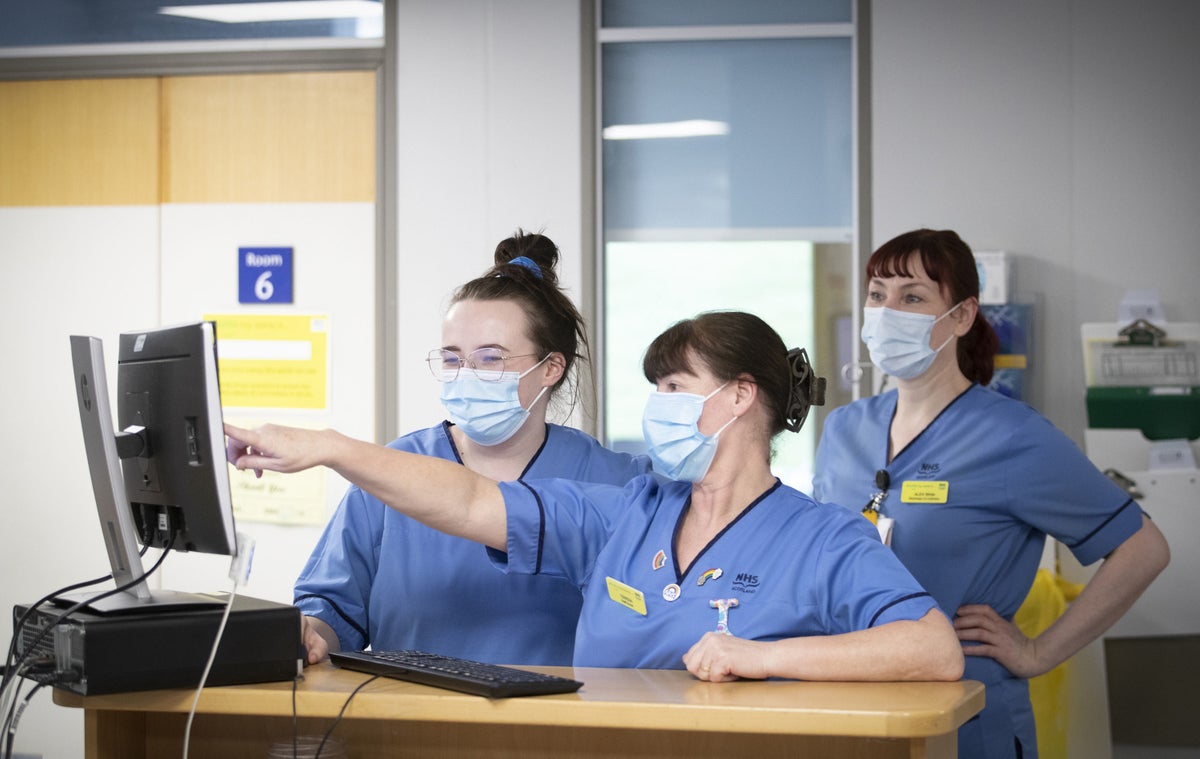
Nurses will suffer a huge wage “hit” this year if the Government imposes a pay rise well below the soaring rate of inflation, unions have warned.
The TUC said its analysis showed that nurses’ pay will be down by as much as £1,600 in real terms this year if ministers impose a 3% pay settlement.
Porters’ real pay will be down by £1,000, maternity care assistants’ by £1,200 and paramedics’ by up to £2,000, said the union organisation.
A below-inflation pay rise for NHS staff this year would be “swallowed up” by rising energy costs, with energy prices rising 40 times faster than NHS workers’ wages this year in the event of a 3% settlement, said the TUC.
After a brutal decade of wage cuts and freezes overseen by successive Tory governments, NHS staff have been pushed to the brink by skyrocketing bills
It warned that NHS workers were on the brink, after a “brutal decade” of pay cuts which have left them thousands of pounds worse off.
NHS workers received a 3% pay rise last year and unions say ministers have asked the NHS Pay Review Body to recommend a similar award this year, despite RPI inflation reaching double figures.
The TUC said its study showed that nurses’ real pay was down £5,200 compared with 2010, warning that stagnant wages have played a major role in the “crippling staff shortages” in the NHS.
England faces a £2.1 billion loss of economic activity as a result of NHS wages failing to keep pace with inflation, according to the TUC.
General secretary Frances O’Grady said: “Our brilliant key workers in the NHS helped get Britain through the pandemic, but many are now at breaking point, struggling to afford the basics and put food on the table.
“After a brutal decade of wage cuts and freezes overseen by successive Tory governments, NHS staff have been pushed to the brink by skyrocketing bills.
“Miserly pay offers will only be swallowed up by runaway prices.
“Any offer that falls below the cost of living will be a hammer blow to staff morale, especially as staff shortages continue to cripple vital services, and many NHS workers may choose to vote with their feet.
“It’s time the Government started to undo the damage of the past decade. That means giving all our key workers the decent pay rise they are owed.”
Overworked, demoralised and experienced staff need much more if they are to be persuaded to stay and see the NHS through the worst crisis in its history
Unions believe the Pay Review Body has made its recommendation to the Government for this year’s pay rise – due from April – and are waiting for ministers to make an announcement.
The report was published as thousands of people are set to march in London on Saturday June 18 to take part in a TUC demonstration to demand Government action on standstill wages and the soaring cost of living.
Unison general secretary Christina McAnea said: “It would be a disaster for the NHS and its patients if the Government were to stick to the miserly 3% ministers thought was enough earlier in the year.
“Soaring inflation has made a nonsense of that. Overworked, demoralised and experienced staff need much more if they are to be persuaded to stay and see the NHS through the worst crisis in its history.
“The Prime Minister can no longer say he’s waiting for the Pay Review Body to report. He must get on and deliver the above-inflation pay rise the NHS needs if it is to end the lengthening waits for treatment that are causing such misery.”
Royal College of Nursing general secretary Pat Cullen said: “If the pandemic was not enough to make ministers appreciate nursing’s value, then the escalating cost-of-living crisis and the nursing exodus must make them wake up.
“This research backs up our own which found that more than a decade of real-terms pay cuts has left the nursing profession in a dreadful position.
“With inflation heading into double figures, too many are struggling with living costs, including choosing between eating and heating and it’s not even winter.
“Any day now ministers will announce the next NHS pay award and it needs to be a significant one. They must be bold and give nursing staff a pay award that beats inflation by 5%.”
A Department of Health and Social Care spokesperson said: “We are incredibly grateful to all our NHS staff and we recognise the pressures caused by the rising cost of living.
“NHS staff received a 3% pay rise last year, increasing nurses’ pay by £1,000 on average despite a public sector pay freeze, and we are giving NHS workers another pay rise this year. No decisions have been made, and we will carefully consider the recommendations from the independent pay review bodies once we receive them.
“Government support for households affected by rising prices includes cutting fuel duty, raising the threshold at which people start to pay national insurance, and cutting taxes for the lowest-paid workers on universal credit so they can keep more of what they earn.”







